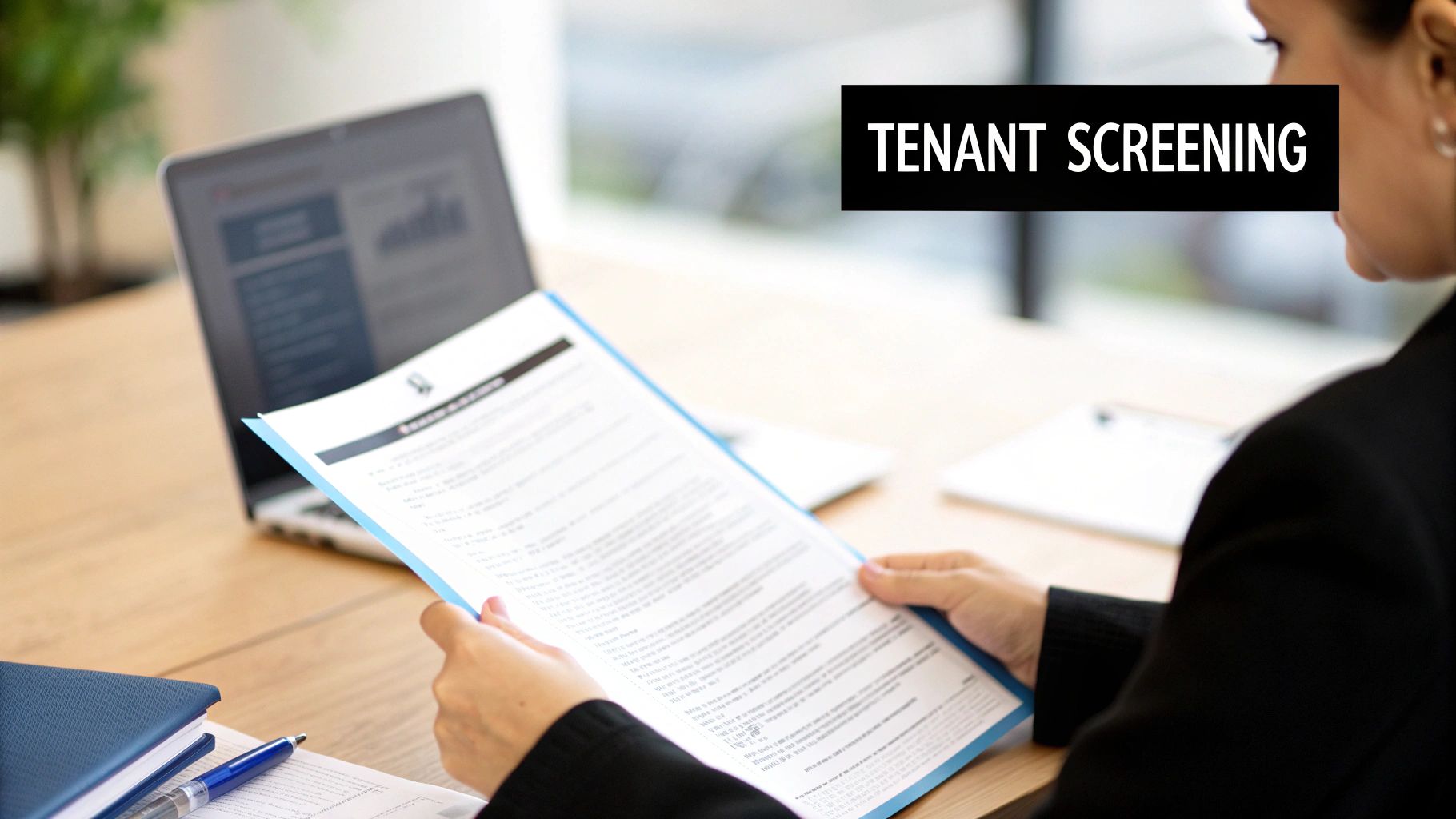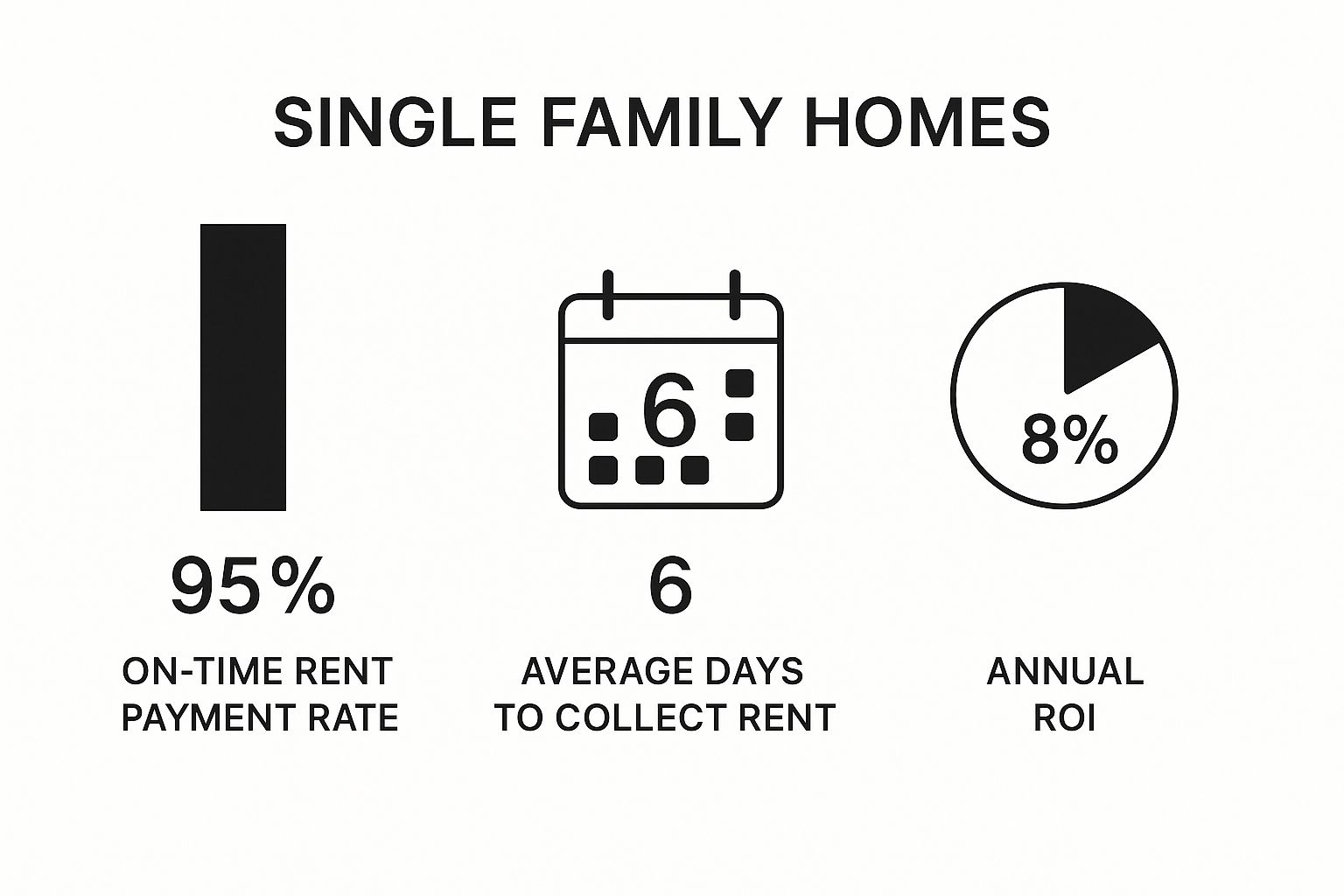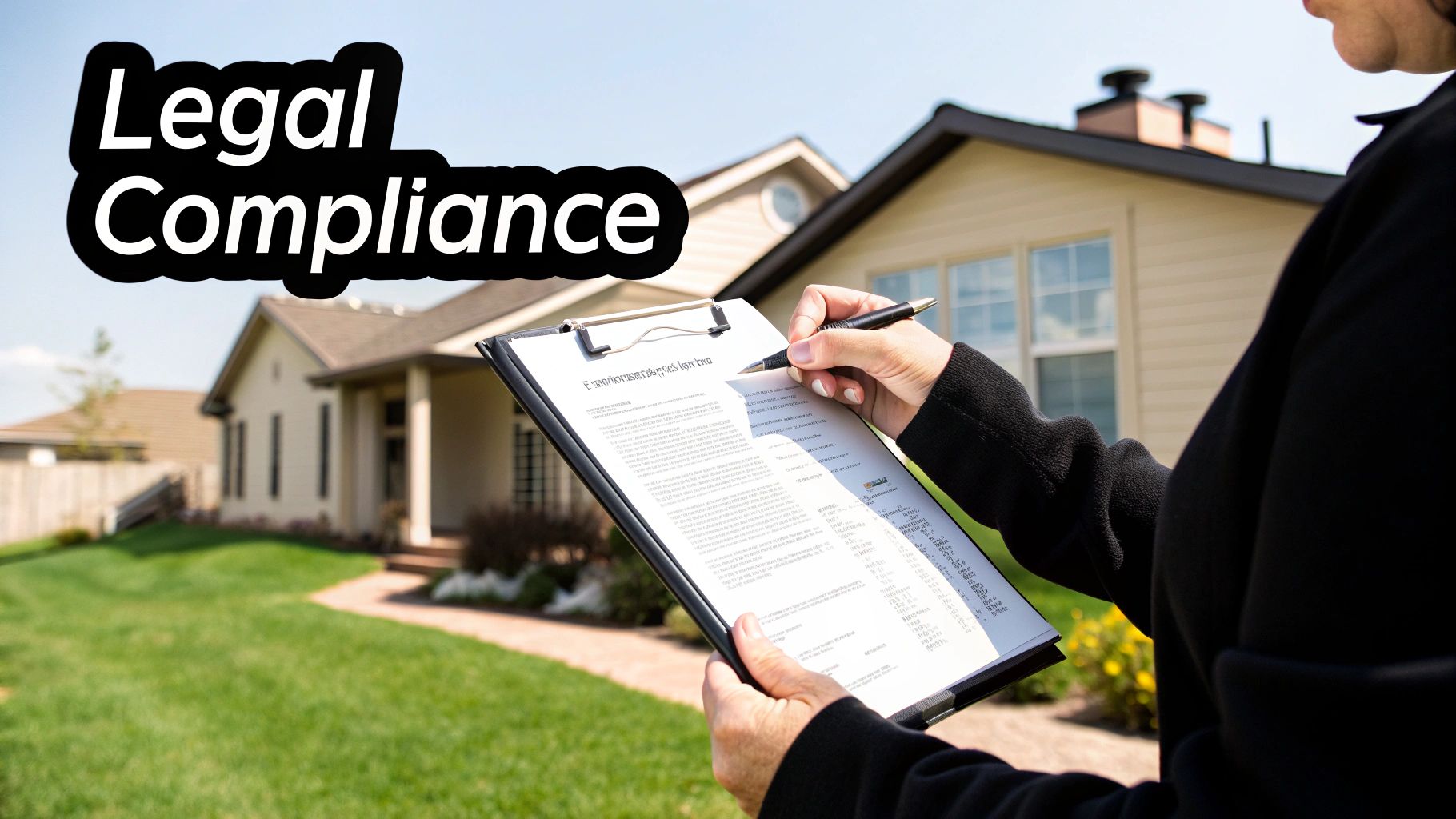Property Management for Single Family Homes: A Landlord's Ultimate Guide
- Sarah Porter

- Sep 3, 2025
- 15 min read
Managing a single-family home isn't just a smaller version of apartment management. It’s a completely different ballgame. You’re not just looking after a unit; you're the custodian of someone's individual property, responsible for everything from finding the right tenants and handling maintenance to managing the books.
This work requires a much more personal touch. It’s all about protecting the unique character and long-term value of each home, which is why single-family rentals have become such a huge and specialized part of the real estate world.
Understanding Today's Single-Family Rental Market
To do this job well, you first have to get a feel for the market itself. Things have changed a lot recently. We're seeing a major shift where renters aren't just looking for a roof over their heads; they want a specific lifestyle that only a single-family home can provide. This isn't some passing trend—it's a real movement rooted in big economic and social shifts.
The appeal of a single-family rental is about so much more than just four walls. People are actively seeking out more space, a private yard for the kids or the dog, and the sense of belonging that comes with living in a real neighborhood. For many, renting a house is either a trial run for homeownership or the best available option in a housing market that has priced them out of buying.
The Forces Driving Demand
This surge in interest didn't come out of nowhere. A few key factors are feeding the single-family rental boom, and it started with the pandemic fundamentally changing how people want to live. A dedicated home office and a private backyard suddenly became non-negotiable, making a cramped apartment feel a lot less attractive.
At the same time, the economy is playing a massive part. As home prices and interest rates climbed, many would-be buyers were pushed back into the rental market, intensifying the demand for single-family homes. The numbers back this up: the count of renter-occupied single-family homes in the U.S. jumped by 18% in recent years, and average rents followed, rising over 4% year-over-year.
For property investors who know what they're doing, this strong demand is a clear signal of a healthy, profitable market. If you want to dive deeper, you can find more insights on the rising demand for single-family rentals and the 2025 outlook.
A key takeaway for property owners is this: your rental isn't just competing with other houses. It's competing with the entire rental market, including large apartment complexes. Highlighting features like a fenced yard, garage, or proximity to good schools gives you a powerful competitive advantage.
The table below breaks down the key factors influencing the single-family rental market, offering a clearer picture of what's happening behind the scenes.
Key Drivers of Single Family Rental Demand
Driving Factor | Impact on Property Management | Market Implication |
|---|---|---|
Rising Homeownership Costs | A larger pool of qualified, long-term tenants who treat rentals like their own homes. | Sustained high demand for rental properties, leading to stable occupancy and potential rent growth. |
Lifestyle Shift (Post-Pandemic) | Tenants are prioritizing amenities like home offices, yards, and more living space. | Properties with these features command higher rents and attract tenants more quickly. |
Desire for Community & Space | Renters are looking for neighborhood feel, good schools, and suburban perks. | Properties in desirable school districts or family-friendly communities are premium assets. |
Increased Household Formation | Millennials and Gen Z are forming families and need more space than typical apartments offer. | Growing demographic of renters seeking larger, multi-bedroom homes for the long term. |
Understanding these drivers is essential because they don't just explain market trends; they directly impact how you manage your properties.
What This Means for Your Property
Knowing what’s happening in the market is what separates a good property manager from a great one. It tells you exactly how to market your property, who your ideal tenant is, and how to price your rent to be competitive yet profitable.
When you have this context, you stop thinking like you’re just managing a building and start acting like you’re strategically positioning a valuable asset. You can anticipate what tenants need and get ahead of the curve. By seeing the bigger picture, you can align your management style with what today's renters are truly looking for, ensuring your investment stays valuable and profitable for years to come.
Finding and Keeping Great Tenants

Let's be honest—the success of your single-family rental comes down to one thing: the people living in it. A fantastic tenant who pays on time, treats your property like their own, and sticks around for a few years is the gold standard. They make this business profitable and predictable.
On the other hand, a bad tenant can turn your investment into a nightmare, costing you thousands in repairs, legal battles, and agonizing vacancies.
The trick is to build a reliable system that not only attracts the right kind of applicants but also weeds out the wrong ones. This process doesn't start when an application lands in your inbox. It starts with how you market the home from day one.
Crafting a Standout Property Listing
A lazy, two-sentence ad will get you lazy, uninspired applicants. If you want to attract someone who will care for your property, you need to put in the effort to create a compelling listing that showcases the lifestyle your home offers.
Don't just list facts; tell a story. Instead of "3 bed, 2 bath," talk about the "spacious, fenced-in backyard perfect for summer barbecues" or the "bright, airy bonus room that makes a great home office." High-quality photos are non-negotiable. Grab a decent camera (your phone is probably fine!), open the blinds, and shoot on a sunny day.
A top-tier listing should always include:
A descriptive headline: "Charming 3-Bed, 2-Bath with Fenced Yard in Quiet Neighborhood" grabs way more attention than "House for Rent."
A detailed summary: Walk them through the layout, mention key features, and highlight any recent upgrades. What makes your home special?
Professional photos and a video: Get shots of every room, the front exterior, and the backyard. A quick video walkthrough can do wonders for engagement.
Clear rental terms: Be upfront about the rent, security deposit, lease length, and your pet policy. This saves everyone time.
Once it's ready, get your listing out there. Posting on major rental sites like Zillow, Trulia, and HotPads casts a wide net, giving you the best possible pool of applicants to choose from.
Implementing a Rigorous Screening Process
As the applications start rolling in, your best defense against future headaches is a consistent, bulletproof screening process. This goes way beyond a simple credit check. You’re building a complete picture of each applicant.
To stay compliant with Fair Housing laws, it's critical that every single person over 18 goes through the exact same screening steps. No exceptions.
The screening process isn’t about being judgmental; it's about being diligent. You are entrusting someone with an asset worth hundreds of thousands of dollars. Verifying their ability and history of paying rent and caring for a property is a fundamental business practice.
Your screening checklist should be non-negotiable. Every applicant gets the same treatment.
Credit Check: Look for a solid history of paying bills on time. A low credit score isn't always a deal-breaker, but a pattern of late payments and collections is a major red flag.
Background Check: This uncovers any relevant criminal history that might pose a risk to your property or the community.
Income Verification: The industry standard is that an applicant's gross monthly income should be at least three times the rent. Don't just take their word for it—verify it with recent pay stubs or an official offer letter.
Past Rental History: This is huge. Call their last two landlords and ask the important questions: Did they pay on time? Did they cause any damage? Would you rent to them again?
Following a system like this takes the emotion and guesswork out of the decision. It allows you to choose your next tenant based on facts and data. For more strategies, check out our guide on how to attract and retain quality tenants.
Getting Rent and Finances in Order

Let's be honest: consistent, on-time rent payments are the lifeblood of your rental investment. When the financial side of things gets messy, it creates a cascade of cash flow problems and administrative nightmares. The whole point is to build a professional, streamlined system that makes life easier for both you and your tenant.
The single biggest upgrade you can make is to modernize how you collect rent. Chasing down mailed checks or arranging in-person pickups is a relic of the past—it’s inefficient and frankly, unreliable. Today’s renters don’t just prefer digital payments; they expect them. Offering that convenience is one of the best ways to cut down on late payments.
Online rent collection platforms are an absolute must for anyone serious about property management for single family homes. They let tenants set up automatic, recurring payments. Just like that, the rent shows up in your account on the same day every month. No reminders, no hassle.
By making it easy for tenants to pay, you're proactively solving problems before they start. The small friction of finding a stamp and mailing a check can be enough to cause a delay. A simple online portal removes that obstacle completely.
Setting and Adjusting Rent Prices
Figuring out what to charge for rent is a real balancing act. If you aim too high, you're stuck with a vacant property, and that vacancy will cost you far more than a slightly lower rent ever would. But if you price it too low, you're just leaving money on the table month after month.
The trick is to do your homework with a solid comparative market analysis (CMA). Look at truly similar single-family homes—same bed/bath count, comparable square footage, similar amenities—in your specific neighborhood. Don't just scroll through online listings; get in your car and drive by the properties to get a real feel for them. This data-driven approach takes the guesswork out of the equation.
The U.S. single-family rental market has been climbing steadily. Recently, prices jumped over 2% year-over-year. Even lower-priced rentals saw a bump of nearly 2%, while higher-end properties saw a more significant 3.2% gain. Regional markets can be even hotter, with some areas seeing increases of over 6%. You can discover more insights about single-family rent trends to see how your area stacks up.
What does this mean for you? You should be re-evaluating your rent every year. A modest, well-justified increase when the lease is up for renewal is a standard part of running a rental business and keeps your investment performing at market value.
Managing Deposits, Fees, and Records
Getting the finances right goes beyond just collecting rent. It's about handling every dollar with professionalism and transparency.
Security Deposits: This is a big one. You absolutely must keep security deposit funds in a separate bank account. In many states, it’s the law. Never, ever mix them with your personal or operating funds.
Late Fees: Your policy for late fees needs to be crystal clear and written into the lease agreement. The key is to apply it consistently and fairly to every tenant, every time, which protects you from any claims of discrimination.
Financial Records: Meticulous record-keeping isn't just a good idea; it's non-negotiable. If you track all your income and expenses as they happen, you’ll thank yourself when tax season rolls around. If you need a hand getting started, check out our guide on bookkeeping for rental properties made simple.
Nailing down these financial best practices is what turns a rental property from a hobby into a profitable business. It protects your investment and helps you maintain a professional, positive relationship with your tenants.
Adopting a Proactive Maintenance Strategy
When it comes to managing single-family homes, the best in the business aren't just putting out fires—they’re preventing them from ever starting. It's a fundamental shift in thinking. Instead of waiting for that panicked call about a broken water heater, you're servicing it before it has a chance to fail.
This proactive mindset is a total game-changer. It takes maintenance from an unpredictable, budget-busting emergency and turns it into a scheduled, manageable expense. More than that, it sends a clear message to your tenants: you care about the property. A tenant who sees you actively maintaining their home is far more likely to stick around.
You can see below how vital solid management practices are. Key metrics like on-time payments and overall ROI are directly tied to how well a property is run, and proactive maintenance is a huge piece of that puzzle.

The data doesn't lie. Strong management leads to better financial outcomes, and staying ahead of repairs is at the heart of that strength.
Building Your Maintenance Playbook
Getting proactive starts with a calendar and a plan. Seasonal checklists are your best friend here, making sure crucial tasks don't get overlooked. Think of it as a regular physical for your property, designed to catch small problems before they become full-blown catastrophes.
Your seasonal schedule should look something like this:
Spring: Get on the roof (or have someone do it) to check for winter damage. Clean out gutters, test all smoke and carbon monoxide detectors, and get that HVAC system tuned up before the first heatwave.
Summer: Inspect the deck for any loose boards or popped nails. Keep an eye out for pests and make sure tree limbs and shrubs are trimmed back from the house.
Fall: Time to service the furnace. Check and seal any drafts around windows and doors, and don't forget to winterize the outdoor spigots and sprinkler system.
Winter: During a deep freeze, remind tenants to keep a trickle of water running. You also need a plan for keeping walkways clear of ice and snow to avoid a nasty liability claim.
These regular checks are the foundation of protecting your asset. For more detail on how to structure these visits effectively, you can check out a landlord's guide to rental property inspections.
Proactive vs Reactive Maintenance Tasks
To see how this works in the real world, just look at the difference between scheduled upkeep and emergency repairs.
Maintenance Area | Proactive Task (Example) | Reactive Repair (Example) | Long-Term Benefit |
|---|---|---|---|
HVAC System | Annual furnace & AC tune-up | Emergency AC replacement in July | Extends unit life, improves efficiency, prevents tenant discomfort |
Roof & Gutters | Biannual gutter cleaning | Fixing interior water damage from an ice dam | Protects foundation & siding, prevents costly water intrusion |
Plumbing | Regular drain cleaning & water heater flush | Calling a plumber for a major sewer backup | Avoids catastrophic water damage and expensive emergency calls |
Pest Control | Sealing entry points & routine spraying | Full-scale extermination for an infestation | Prevents property damage and keeps tenants happy |
As you can see, a little foresight goes a long way in protecting both your property and your wallet.
A proactive approach isn't just about avoiding breakdowns; it's about smart financial management. Spending $150 on an annual HVAC tune-up is a world away from being hit with a $5,000 bill for an emergency replacement on the hottest day of the year.
Your Go-To Team of Contractors
Let’s be realistic: you can’t do it all yourself. A huge part of any solid maintenance strategy is building your roster of reliable, insured contractors before you're in a jam. The middle of a plumbing emergency is the absolute worst time to be frantically Googling for someone trustworthy.
Start building that network now. You need a go-to pro for each of the major trades:
A great plumber you can trust for everything from a leaky faucet to a burst pipe.
A licensed electrician who can safely handle faulty wiring or breaker issues.
An experienced HVAC technician for essential heating and cooling maintenance.
A reliable handyman for all the smaller, non-specialized jobs that inevitably pop up.
When a tenant submits a repair request (ideally through an online portal so you can track everything), you can dispatch your trusted contact right away. A fast, professional response doesn't just fix the problem—it reinforces your reputation as a great landlord, making tenants feel secure and taken care of.
Staying Compliant with Landlord-Tenant Laws

If there’s one area of property management that can trip up even seasoned pros, it’s the legal side. Navigating landlord-tenant law isn't just about knowing the rules; it's about understanding that these aren't mere suggestions. They're a complex web of federal, state, and local regulations that carry serious weight.
One misstep, even an accidental one, can spiral into costly lawsuits and fines that can sink an investment. You don't need a law degree to manage a property, but you absolutely need a solid grasp of the basics. This knowledge lets you operate with confidence and, crucially, helps you spot a situation where you need to pick up the phone and call a lawyer.
The Cornerstone: Fair Housing Laws
Everything starts with the Fair Housing Act. This federal law is the bedrock of non-discrimination in housing, and its principles should guide every single action you take as a landlord. It prohibits discrimination based on race, color, religion, national origin, sex (which now includes gender identity and sexual orientation), disability, and familial status.
This isn't just about obvious discrimination. It covers everything from the language in your rental ads to your screening criteria and how you respond to a late-night maintenance call.
Where I see many landlords get into trouble is with seemingly neutral policies that inadvertently create a discriminatory effect. For example, a blanket "no children" rule is a direct violation of familial status protection. Even something less obvious, like an occupancy standard that's far stricter than local code, could land you in hot water.
The golden rule of Fair Housing is simple: treat everyone the same. Your screening criteria must be identical for every single applicant. Consistency is your absolute best defense if a discrimination claim ever comes your way.
Crafting an Ironclad Lease Agreement
Think of your lease as the single most important document protecting your investment. It’s the binding contract that lays out every right and responsibility for both you and your tenant. A generic template you find online just isn't going to cut it—it’s a recipe for disaster.
A strong, state-specific lease for a single-family home needs to be airtight. It should spell everything out clearly, leaving no room for interpretation.
Rent and Fees: Detail the exact rent amount, the due date, how tenants can pay, and your precise policy on late fees.
Maintenance Responsibilities: Be specific. Who handles lawn care? Who changes the HVAC filter? Typically, landlords cover major systems, while tenants handle minor upkeep, but you need to write it down.
Rules of Entry: State the notice you'll provide before entering the home for inspections or repairs. This is often 24 hours, but your local laws dictate the minimum.
Security Deposit: Clearly define the deposit amount, where the funds will be held (some states have specific rules for this!), and what kind of damages would lead to deductions when the tenant moves out.
The property management industry is a serious business, with the U.S. market projected to generate over $81 billion in revenue. That kind of scale brings a higher level of professionalism and much tighter regulatory oversight. A vague lease is a massive liability in this environment. You can explore more property management statistics and trends to see just how much the industry has evolved.
In the end, staying compliant is about more than just avoiding lawsuits. It's about protecting your asset and building a professional, respectful relationship with your tenants from day one.
Common Questions on Single Family Home Management
When you're in the trenches of managing a rental property, it's natural for questions to pop up. Let's tackle some of the most common ones we hear from landlords, offering practical answers to the real-world challenges you'll face.
How Much Rent Should I Charge for My Home?
Nailing the right rent price is a delicate balance. The best place to start is with some good old-fashioned market research. Look at what similar homes are renting for right in your neighborhood. You're looking for direct comparisons—properties with the same number of bedrooms, comparable square footage, and similar perks like a garage or a fenced-in yard.
Online rental sites give you a quick snapshot, but don't just stop there. I always recommend taking a drive through the neighborhood. Seeing the competition with your own eyes gives you a feel for the area that a webpage just can't.
Remember, it's almost always better to price your home competitively to land a great tenant fast. Overpricing it might seem appealing, but letting it sit empty for even one month will cost you far more than setting a realistic rent from day one.
What Is the Most Cost-Effective Way to Handle Repairs?
Honestly, the cheapest repair is the one you never have to make. Being proactive with maintenance will save you a fortune compared to waiting for things to break. I suggest creating a simple seasonal maintenance checklist—things like servicing the HVAC in the spring and fall or cleaning out the gutters before the rainy season hits.
When a repair does come up, a hybrid approach often works best. If you're handy, tackle the small stuff yourself—changing air filters, tightening a doorknob, or patching a small hole in the wall.
But for anything that touches major systems like plumbing, electrical, or HVAC, it's time to call in the pros. Start building your list of trusted, insured vendors before you're in a panic.
Trust me, having a go-to plumber's number saved in your phone when a pipe bursts is infinitely cheaper than frantically searching for one during an emergency. That last-minute, after-hours call comes with a serious price premium.
Should I Manage the Property Myself or Hire a Company?
This really comes down to a trade-off: your time versus your money.
Going the DIY route can definitely save you the 8-12% management fee, which adds up. This is a great option if you live nearby, don't mind getting your hands dirty, and have the flexibility to drop everything for a tenant emergency.
On the other hand, if you live far away, want your weekends back, or simply want your investment to be passive, hiring a professional is money well spent. Good property management for single family homes takes all the headaches off your plate.
Here's what you're really paying for:
No More Late-Night Calls: The manager is the one who gets the call when the water heater goes out at 2 a.m.
Expert Tenant Screening: They have proven, legally sound systems for finding high-quality tenants.
Staying on Top of the Law: They know the ins and outs of landlord-tenant laws, which seem to change constantly.
Handling the Tough Stuff: If an eviction becomes necessary, they manage that difficult and stressful process for you.
Ultimately, a property manager's job is to protect your investment and your peace of mind, turning your rental from a second job into a true source of income.
If you're looking for a partner to handle the complexities of your rental investment, Keshman Property Management can help. With over 20 years of experience, we make owning rental properties less daunting and more gratifying. Learn more about our services.

Comments